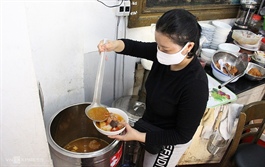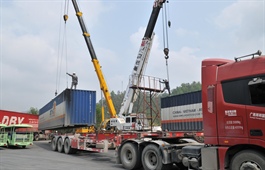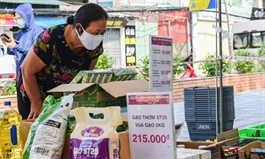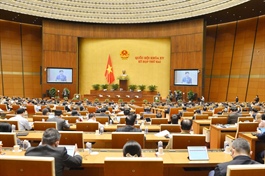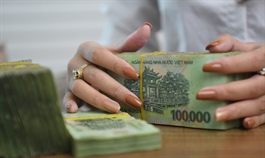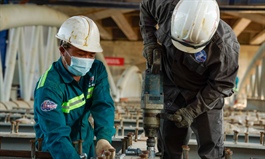VN's growth and recovery require strong public investment: Economists
VN's growth and recovery require strong public investment: Economists
Financing public investment to generate future growth and to speed up economic recovery post-COVID-19 remained Viet Nam's most important challenge in the near future, said economists and policymakers.

A recent report by the United Nations Development Programme highlighted a number of the Southeast Asian economy's shortcomings and limitations. From 2002 to 2019, public investment (as a share of GDP) was said to fall from 22 per cent to 11 per cent while demand for infrastructure had been increasing.
This is especially true in coping with climate change, a rising threat to Viet Nam – a densely populated country with two low-lying deltas and a long coastline.
The Southeast Asian economy must also commit significant investments to reduce its logistics costs, transit time, modernise cities and improve digital connectivity to stay competitive internationally. While some progress has been made, the country is still behind regional rivals such as Malaysia and Thailand on this front.
Innovation has been slow. Viet Nam typically spends just 0.5 per cent of its GDP on research and development in recent years, far below what is required to maintain a competitive edge in the region. In comparison, Thailand spends over 1 per cent and Malaysia close to 1.5 per cent.
To make matter worse, disbursement of public investment has slowed to a crawl since the beginning of the year, especially after the fourth outbreak of the virus in April.
Disbursement of public investment during the first ten months of the year was VND257.387 trillion (US$11.3 billion) or nearly 55.8 per cent of the year's target, according to the latest report by the Ministry of Finance.
Even when the money was spent, issues have been raised over its efficiency. The country's decentralised approach has resulted in the fragmentation of its planning system in which local projects were approved in isolation and without sufficient reference to national strategic priorities. In addition, the implementation of hundreds of small projects incurred unnecessary costs and slowed delivery.
This has called for policymakers to carry out reforms of economic institutions with an emphasis on seeking new sources of long-term financing for its infrastructure projects.
Outbreak
While initially experiencing some slowdown, the country was able to mount a strong comeback in the latter half of 2020, ending the year with positive GDP growth, an impressive feat against a backdrop of a bleak global economy.
However, the fourth outbreak of the virus in Viet Nam has been a game-changer. As major towns, provinces and industrial hubs across the country were forced to go into lockdown during the fourth outbreak, the economy has suffered a massive blow. Viet Nam's GDP growth forecast has been lowered to 2.2.5 per cent this year in the latest report by World Bank.
A recent survey by the Centre for Analysis and Forecasting of the Viet Nam Academy of Social Sciences in July indicated 63.5 per cent of Vietnamese households experienced an income drop of at least 30 per cent compared to the pre-pandemic level, which has resulted in a nosedive in demand for goods and services.
"Viet Nam's fiscal response to the pandemic was inadequate," said Jonathan Pincus, UNDP senior international economist specialised in Southeast Asia.
Pincus said contraction of private consumption would result in considerable suffering and slower GDP growth than was necessary. Recovery would be slower because the shortfall of demand would cause bankruptcies.
He urged policymakers to implement financial reforms and to create new financial institutions to increase the supply of long-term credit to finance new infrastructure and national competitiveness. He also called for curbs on over-lending to properties and equities, a halt to capital inflows during periods of excessive credit growth and deficit spending while demand is slowing down.
Vo Tri Thanh, former vice-president of the Central Institute for Economic Management (CIEM) and a member of the National Financial and Monetary Policy Advisory Council, said the pandemic had forced Viet Nam to reconsider their approaches to national development and implement policies that were unprecedented.
"Developing countries may consider two consecutive quarters with negative growth as a recession. For Viet Nam, a 2 per cent growth could be considered a recession," Thanh told Viet Nam News.
There has been a reverse of fortune as Viet Nam's GDP growth this year has been reduced to 2-2.5 per cent while the global economy was expected to grow by 5-6 per cent. Last year, Viet Nam recorded a 2.91 per cent GDP growth while the global economy was at negative 4 per cent.
"Viet Nam's economy is not without bright spots including strong macroeconomic indicators, growing exports and a healthy inflow of FDI," he said. However, the government's priorities, for now, were stimulating demand, investment and economic recovery.
Thanh said the government-sponsored recovery programme must cover and focus on the economy's key sectors with fiscal policies to play an important role. Thanh said a short-term budget deficit may be tolerable to shore up the programme's financial strength.
He called on the government to turn the pandemic into an opportunity to initiate reforms and implement new policies to improve productivity and the business environment and to boost innovation and start-up culture.









